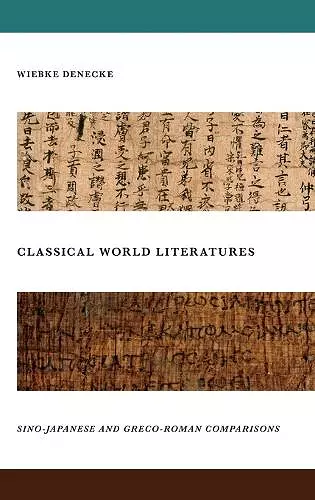Classical World Literatures
Sino-Japanese and Greco-Roman Comparisons
Format:Hardback
Publisher:Oxford University Press Inc
Published:16th Jan '14
Currently unavailable, and unfortunately no date known when it will be back

Ever since Karl Jasper's "axial age" paradigm, there have been a number of influential studies comparing ancient East Asian and Greco-Roman history and culture. Most of these have centered on the emergence of the world's philosophical and religious traditions, or on models of empire building. However, to date there has been no comparative study involving literatures of multiple traditions in the ancient East Asian and Mediterranean cultural spheres. At first glance, it would appear that the literary cultures of early Japan and Rome share little in common with each other. Yet both were intimately connected with the literature of antecedent "reference cultures," China and Greece respectively. These connections had far-reaching legal, ethical, material, linguistic, bibliographical, and literary consequences that made for distinctive Sino-Japanese and Greco-Roman dynamics. Exploring writers from Ôtomo no Yakamochi to Sugawara no Michizane and Sei Shônagon and from Cicero and Virgil to Ovid and Martianus Capella, Classical World Literatures captures the striking similarities between the ways Early Japanese writers wrote their own literature through and against the literary precedents of China and the ways Latin writers engaged and contested Greek precedents. Chapters engage in issues ranging from early narratives of literary history, cultural foundation figures, literature of the capital and poetry of exile, to strategies of cultural comparison in the form of parody and satire or synoptic texts. The book also brings to light suggestive divergences that are rooted in geopolitical, linguistic, sociohistorical, and aesthetic differences between Early Japanese and Roman literary cultures. Author Wiebke Denecke examines how Japanese and Latin writers were affected by an awareness of their own belatedness, how their strategies in telling of the origins of their own literatures evolved, and how notions about simplicity, ornateness, and cultural decline came to be blamed on the influence of their cultural ancestors. Proposing an innovative methodology of "deep comparison" for the cross-cultural comparison of premodern literary cultures and calling for an expansion of world literature debates into the ancient and medieval worlds, Classical World Literatures is both a theoretical intervention and an invitation to reading and re-reading four major literary traditions of the classical world in an innovative and illuminating light.
This is an extraordinary book. Undoubtedly the first of its kind, it opens up a new field of research and it does so in a way that allows both the enormous difficulties and the possible rewards of the endeavour to come to the fore. ... Denecke's work shows that even if, at this stage, final overarching conclusions are not yet possible, a comparison of Japanese and Roman literary culture opens new perspectives on each and allows new insights into the general principles of intellectual history. For this the reader will be as grateful as for Denecke's stimulating theoretical reflections on intercultural comparison. * Bryn Mawr Classical Review *
The book is one of a kind and could only have been written by a scholar such as Wiebke Denecke ... daring and erudite book * Gunilla Lindberg-Wada, Monumenta Nipponica *
ISBN: 9780199971848
Dimensions: 165mm x 236mm x 33mm
Weight: 610g
368 pages